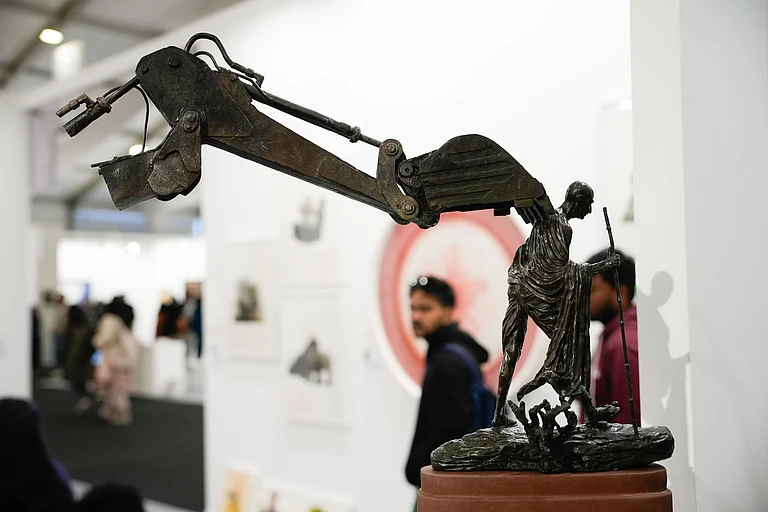Pakistan is still producing an estimated 10,000 potential jehadis a year, wrote The Washington Times editor-at-large, Arnaud de Borchgrave, recently. He had in mind some 11,000 madrassas that produce 5,00,000 graduates annually, whose poverty renders them susceptible to extremism, as well as coercion and blandishments to join terror groups. But the arrest of the western-educated Faisal Shahzad—whose upper-class, modern credentials would have easily won white American acceptance—for the aborted Times Square bombing in New York is testimony to the virus of extremism afflicting Pakistan across class boundaries. Neither modernity nor wealth necessarily inoculates the Pakistani from contracting the jehadi infection.
Look at Shahzad’s profile—he’s the son of a former air vice marshal, obtained his Bachelor and Master’s degrees from the US, where he settled to hold jobs at cosmetic giant Elizabeth Arden, before switching to financial marketing services company Affinion Group. He married an American citizen, Huma Mian, a business graduate, and became a US citizen in 2009. Facts that would disarm sleuths tracking terror suspects and prompt smugness from parents.

The Haq family house in Peshawar
Yet, as Shahzad’s arrest grabbed headlines worldwide, gloom descended on a house in the posh locality of Hyatabad in Peshawar, capital of Khyber Pakhtunkhwa (earlier NWFP). On May 4, Tuesday, Air Vice Marshal (retd) Baharul Haq along with family members packed their bags and quietly drove away to an unknown destination. They could foresee the awaiting ignominy—cameramen hounding them for their reaction, for the mandatory alternative narration.
The media’s excitement, understandably, has a dash of disbelief: never has a Pakistani terror suspect had such wealthy and influential antecedents. After retiring from the air force, Baharul Haq joined the Civil Aviation Authority and shifted to Karachi. His other son is an engineer settled in Canada; his brother is Maj Gen (retd) Tajul Haq, who served as inspector general of the Frontier Corps, which has engaged the Taliban in North Waziristan in recent months. The Haq family’s ancestral village is Mohib Banda, near Nowshera, an army garrison town an hour’s drive from Peshawar.
Shahzad’s arrest has stunned the Haq family. His cousin, Sareelul, told the media, “A few months ago, Shahzad attended a wedding in the village. We refuse to believe these allegations.” Childhood friend Ali commented, “He was such a kind boy that he could not even bear a chicken being slaughtered. The only change that I noticed when he was last here was that he had a small goatee and, unlike in the past, said his prayers regularly. But these are good things and do not mean that you are a terrorist.”
The details about Shahzad are still too sketchy to explain how an upwardly mobile boy from an elite background could think of exploding a bomb-laden vehicle in New York. There’s no doubt his background couldn’t have been more cosmopolitan—he had studied in a string of air force schools in towns where his father was periodically posted, schools which, unlike madrassas, don’t indoctrinate children in jehad. Away in the US from the time he passed school, he had returned and stayed for five months in Karachi last year before winging his way back. Could his transformation have come then?
Undoubtedly, Shahzad has been a victim of the financial crisis gripping America. He had lost his house to foreclosure, resigned from his Affinion Group job, was unemployed and become bankrupt. Also, he was reportedly not getting along with his wife, Huma, with whom he had two children. This was also the time, different accounts agree, that he turned religious. It’s possible declining fortunes could have prompted him to direct his ire and frustration against the American system. His feeling of victimhood could have been affirmed through the appropriation of a public cause that has stirred passions in Pakhtunkhwa—the killing of hundreds of innocents in misdirected US drone attacks in the tribal areas.
This identification with the woes of his people perhaps prompted Shahzad to head to the areas bordering Afghanistan. Facilitating his journey was apparently his friend, Mohd Rehan, who was among those detained in Karachi. (Among them is also Huma’s father, Iftikar Mian.) Incidentally, Rehan was detained from a mosque linked to the banned Jaish-e-Mohammed, a group infamous for fomenting terrorism in India. It was Rehan who reportedly took Shahzad to Pakhtunkhwa and then to North Waziristan, where he supposedly got in touch with Qari Hussain Mehsud, who heads the suicide squad of the Tehreek-e-Taliban Pakistan (TTP). Though earlier dismissed as an empty boast, some are now taking seriously the videos recently released by Hakimullah Mehsud in which he had threatened to take terror to mainland America. The Taliban had also claimed the Time Square attempt as their handiwork, only to deny it the following day.

FBI agents at Faisal’s Connecticut house
As investigators try to get a grip on Shahzad’s motives, Pakistan is reeling under the implications of his failed attempt—another addition to the list of Pakistanis involved in jehadi conspiracies abroad. From Ajmal Amir Kasab and David Headley to the five Pakistani-American youths nabbed in Sialkot for plotting against their adopted land, and the bombers of the London underground, terror footprints have been traced to Pakistan. The role of non-resident Pakistanis suggests the advantage terror groups perceive in recruiting their like—their passports enable them to slip in and out of the target country with ease, without arousing suspicion.
These factors apart, the jehadi ambience here has also been an important factor in brainwashing the culturally confused Pakistani, as also empowering him to live out a diabolic dream. The Dawn noted, “It’s been nearly 10 years since 9/11 and still the infrastructure of jehad has not been uprooted. The spread of literature and audio and video paraphernalia glorifying jehad and calling violence against the West, India, Israel, etc continues unchecked. The state needs to enhance its response and beef up intelligence.” The News wanted “psychologists, educators, media people, clerics and others with social influence” to devise a strategy for countering the unabated, virulent indoctrination.
Meanwhile, Shahzad’s purported link to North Waziristan has the authorities on the defensive. Army spokesperson Maj Gen Athar Abbas says, “Unless a link is established, it will be premature to say he had gone there. As for the TTP claim, anybody can claim anything.” Foreign minister Shah Mehmood Qureshi tried another tack to absolve Pakistan’s complicity, “Faisal is a US citizen. We see US drone attacks in Pakistan. This could be a retaliation and you could expect that—let’s not be naive. They’re not going to sit and welcome you to eliminate them. They are going to fight back.”
These comments provide a glimpse of Islamabad’s apprehension—it’s likely to come under increased pressure to send its troops into North Waziristan for flushing out terrorists, as was done in South Waziristan. For the moment, though, the Pakistani diaspora will have to countenance a backlash from the Americans and their increasingly nervous, suspicious state.





















